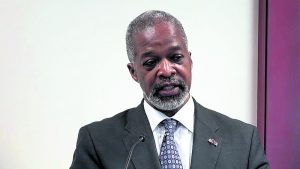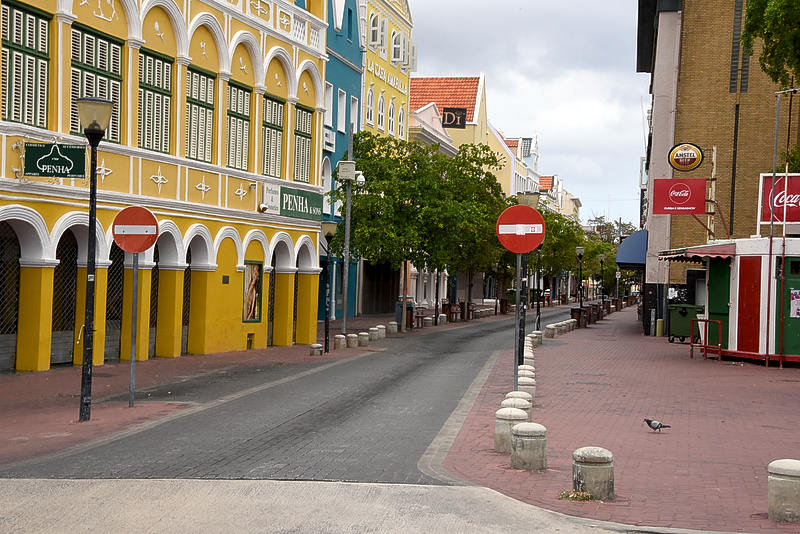WILLEMSTAD.- With unmatched exuberance, the Curaçao government announced the Rijksministerraad (RMR) decision of March 27, 2020, to exempt Curaçao from complying with the provisions of article 15 paragraph 1 of the Rijkswet financieel toezicht (Rft), which calls for a balanced budget. This decision by the RMR was taken in light of the government’s request in pursuit of article 25 paragraph 1 of the Rft to deal with the consequences of the corona virus crisis, says dr. Emsley Tromp former president of the Central Bank of Curacao and Sint Maarten.

This exuberance proved short-lived, however, when it was announced that on July 3, 2020, the RMR will determine the extent to which Curaçao is allowed to deviate from the provisions spelled out in article 15 paragraph 1 of the Rft. After three months of the RMR’s decision in March and after a host of RMR-mandated actions to be taken in anticipation of receiving financial assistance to mitigate the impact of the corona virus crisis, the announcement that on July 3, 2020, RMR will determine the extent to which Curaçao may deviate from article 15 paragraph 1 stunned everybody. In fact, the announcement came close to meeting the textbook definition of fake news. This qualification of the RMR’s March decision has further clouded the economic outlook of the island and created uncertainty regarding the depth and duration of the impact of the corona virus crisis on an economy already in recession. The overarching consequence of these disruptive prior actions involves the further weakening of the Curaçao economy. Like many of its decisions, the Curaçao government’s response to these required prior actions has been poorly integrated into any kind of well-articulated policy to reestablish growth.
This policy stance of the RMR becomes increasingly mind boggling in the context of the repeated assurances given by the Dutch Minister of Finance that for the time-being, fiscal consolidation is not the order of the day in the Netherlands. This policy stance is based on the implicit logic that any fiscal consolidation will have a contractionary impact on the Dutch economy. It is also based on the painful lessons learned by both Holland and Brussels from their cataclysmic failure in Greece. Rather than pursuing a policy to promote sustainable growth in Greece, they put a disproportionate emphasis on fiscal consolidation. This policy prescription had far-reaching social implications and a lack of public support without the desired outcome. This same economic reasoning makes fiscal consolidation at this point in time equally prohibitive and ill-timed for Curaçao. Taken together, this RMR-mandated fiscal consolidation, the lack of a credible economic recovery plan and an economy already in the grips of recession suggest that the path ahead has become extraordinarily uncertain with considerable risk of a long and protracted economic downturn.
Both the IMF and the CBCS projections indicate that the impact of the COVID-19 pandemic will be much more pronounced on the Curaçao economy than on the Dutch economy. While the conventional wisdom calls for expansionary fiscal policy and accommodative monetary policy to protect the productive capacity of the country, the RMR persists in those prior actions. This stance would suggest that the pace of recovery may very well be dictated by the scope and quality of those RMR-mandated prior actions rather than determined by economic fundamentals. The question becomes: was there an overarching strategy in establishing requisite prior actions in contravention of the March 27, 2020, decision of the RMR? The consequences of these prior actions are the further weakening of Curaçao’s economy. Who are the chief beneficiaries of a Curaçao with a weaker economy? This move has revived the never entirely dormant belief among some that those prior actions, for whatever reasons, are to subordinate Curaçao’s interest to Holland’s.
CONCLUDING COMMENTS
Tromp believes that to frontload the corona virus assistance at all struck many as dangerous. The requisite prior actions, as some allege, are unnecessarily contractionary and will undermine the Curaçao economy making the path to recovery even more uncertain. Moreover, the economic outlook remains clouded by uncertainty over future assistance to businesses and households, resurgent infections, and the drag of unprecedented job loss on consumer finances. From their point of view, the RMR’s relationship with Curaçao is abusive and imposes a heavy adjustment cost on the people of Curaçao. If we are to pursue a policy geared toward sound macroeconomic policy to achieve sustainable economic growth, reduction of poverty, and sound fiscal policy, then our policy actions and prescriptions must be within the context of an internally consistent policy framework with well articulated policy goals and broad public support. Thus far, this policy agenda seems to be missing. A consequence of the new normal is that the pre-corona virus plans are no longer relevant. While the announced policy intentions of the Curaçao government are to acquiesce to the RMR mandated prior actions, the questions become whether those policy actions are sufficient to address the other pressing issues on the forefront of the national agenda and the impact of their far-reaching budgetary consequences. What comes to mind, among other things, is resolution of the challenges in the financial sector and the refinery. What should not escape the RMR is the fact that the lack of fiscal room to address the corona virus crisis is the result of the Curaçao government, with the prior approval of the Cft, building a debt-to-GDP ratio that is not sustainable. This debt accumulation was facilitated by giving the Curaçao government access to the Dutch financial market to borrow at terms that obviously did not reflect our economic realities. Perhaps the solution to this nagging economic problem may be found in the twenty-ninth verse of the fifth chapter of the Gospel of Matthew in the New Testament.










